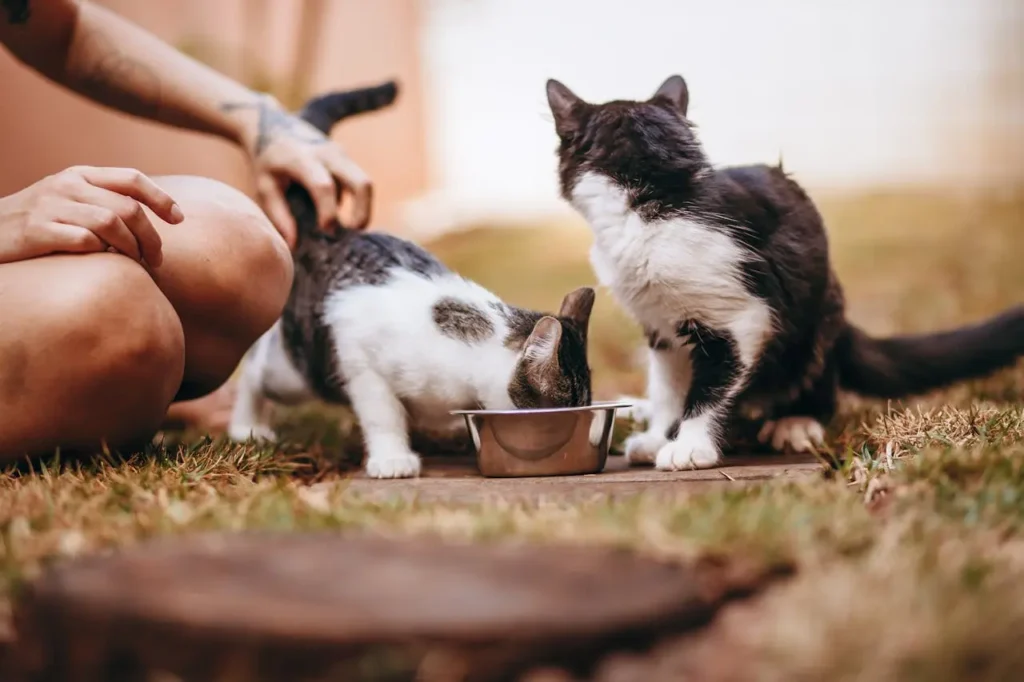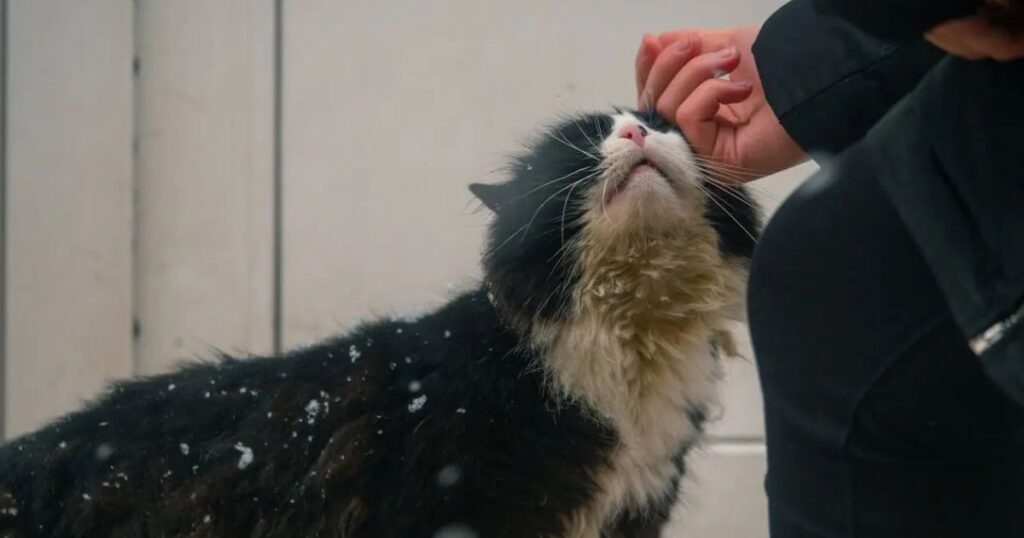Watching my beloved tabby, Daisy, grow older was bittersweet. I worried about her age-related needs and health issues. But I knew the right care could make her golden years comfortable and fulfilling.
If you’re caring for an aging cat, you’re not alone. Senior cat health is crucial, as they face unique challenges. Changes in behavior, mobility, and disease risks require special care and adjustments.
This guide will delve into feline geriatrics and offer vital care tips for aging cats and elderly cat care. Whether your cat is starting or already in their golden years, we’ll help. You’ll learn how to ensure their twilight years are filled with comfort, joy, and well-being.
Identifying When Your Cat Enters the Senior Stage
As your cat gets older, it’s important to know when they become seniors. Cats are usually seniors between 7 to 10 years old. By 12 years, they are considered geriatric. Knowing these ages helps you give them the best care in their golden years.
Signs of Aging in Cats
Senior and geriatric cats show physical and behavioral changes. Some common signs include:
- Slower gait and increased napping
- Stiffness, hearing or vision loss
- Higher risk of chronic diseases like arthritis and kidney issues
- Unintended weight loss or increased thirst
- Behavior changes like increased sleeping or reduced grooming
Transitioning to Geriatric Care
When your cat becomes a senior, it’s key to watch their health closely. Regular vet visits are crucial to catch health issues early. You might also need to change their diet, environment, and activity levels for their comfort.
Understanding aging signs and geriatric care helps your cat live a happy, healthy senior life.
Recognizing Common Health Issues in Senior Cats
As your feline friend ages, they face more health risks. Knowing the common issues can help you care for them better. Let’s look at some key health challenges senior cats have.
Weight Loss and Appetite Changes
Weight loss in senior cats can signal serious health problems. Issues like kidney disease, hyperthyroidism, or cancer might be the cause. Watch your cat’s appetite closely, as a drop in interest in food could mean a health issue.
Increased Thirst and Sleeping Patterns
Senior cats may drink more water and sleep more. These signs can point to kidney disease, diabetes, or cognitive decline. Keep an eye on their water intake and sleep patterns to spot health issues early.
Litter Box Issues and Grooming Habits
Older cats might have trouble with the litter box, like peeing or pooping outside. This could mean arthritis, neurological problems, or cognitive decline. Also, if their coat looks matted or unkempt, it could be a sign of health issues.
It’s crucial to get your senior cat to the vet quickly if you notice any health problems. Regular vet visits and watching your cat closely can help them stay healthy and happy in their golden years.
“The key to caring for senior cats is being attentive to even the slightest changes in their behavior or physical condition. Early intervention can make a significant difference in their quality of life.”
Adapting Your Cat’s Diet for Their Golden Years
As your cat gets older, their diet needs change. It’s important to make sure they get the right food for their health. Cats are considered seniors after 10 years old, but some vets start caring for them at 7.
For senior cat nutrition, you want a balanced diet that meets their needs. Senior cat food has fewer calories and fat. It helps with health issues like kidney disease and arthritis. It also has antioxidants and vitamins to keep their immune system strong.
Talking to your vet is key to finding the right cat food for senior cats. They can tell you what your cat needs and suggest a good feeding plan. It’s important not to overfeed, as it can make weight gain worse.
Senior cats might do better with smaller meals and less treats. They also need a quiet place to eat, with wide, low bowls. Watching their appetite and weight helps you adjust their diet.
Changing your cat’s diet is crucial for their health in their golden years. With the right food and vet advice, your cat can stay healthy and happy.
Ensuring Proper Hydration for Senior Cats
As cats get older, it’s more important to keep them hydrated. Senior cats often deal with health issues like constipation or kidney disease. Drinking enough water can help manage these problems.
To get your senior cat to drink more, put water bowls in different spots around the house. Pet fountains are great because they keep water moving, making it more appealing. Also, adding wet or canned food to their diet can increase their water intake. These foods are mostly water, about 70-80%.
| Hydration Benefits for Senior Cats |
|---|
| Aids in digestion and energy management |
| Helps prevent constipation and kidney disease complications |
| Reduces the risk of bladder crystals and urinary stones |
| Protects the kidneys from potential medication side effects |
Keeping your senior cat hydrated is key to their health and happiness. Watch their water intake and adjust as needed. This will help them stay comfortable and happy in their golden years.

photo by Helena Lopes
“Keeping senior cats hydrated is crucial for their health and comfort. Providing multiple water sources and incorporating wet food can make a big difference.”
Monitoring for Signs of Pain and Arthritis
As your beloved feline companion ages, it’s vital to watch for signs of pain and arthritis. Cats often hide their discomfort. So, it’s key to notice small changes in their behavior that might show they’re not feeling well.
Subtle Indicators of Discomfort
Keep an eye on how your senior cat moves and acts. Look for signs like moving less, not wanting to jump or climb, and sleeping in different spots. They might also groom less, meow more, get upset when touched, or pull away from people.
More than 60% of cats over six show signs of arthritis. This number jumps to over 90% for cats over 12. Older cats and those who are overweight face a higher risk of joint problems.
Management Options for Feline Arthritis
If you think your senior cat has arthritic pain, talk to your vet about a plan. This might include medicine, special food, and changes in their life to keep them comfortable.
- Keep your cat at a healthy weight to ease joint and muscle stress.
- Try supplements like glucosamine and chondroitin for arthritis in cats.
- Make their living space comfy and safe with non-slip floors and easy litter box access.
- Talk to your vet about surgery if your cat’s feline arthritis is severe.
By paying attention to your senior cat’s small signs of pain and working with your vet, you can help them enjoy their golden years comfortably.
Prioritizing Dental Health for Aging Felines
As your cat gets older, their dental health is more important than ever. Senior cats face many oral health problems, like gum disease and broken teeth. Ignoring their dental care can make them uncomfortable and affect their health.
Studies show that up to 90% of cats over four have dental disease. Regular dental check-ups and care, like brushing, can prevent big problems. By focusing on your senior cat’s dental health, you can help them stay pain-free and healthy in their golden years.
The Importance of Dental Hygiene for Senior Cats
Dental health is key for your senior cat. Without proper care, they can face serious issues, such as:
- Gum disease, which can cause inflammation, bleeding, and tooth loss
- Periodontal disease, which affects the structures that support the teeth
- Broken or fractured teeth, which can cause pain and infection
- Oral tumors, which can be life-threatening if left undiagnosed and untreated
Regular dental cleanings and exams are vital for your cat’s oral health. These services remove plaque and tartar, find hidden problems, and treat them to prevent more issues.
Maintaining Your Senior Cat’s Dental Health at Home
You can also help your senior cat’s dental health at home. Here are some ways:
- Brush their teeth 2-3 times a week with a soft-bristled toothbrush and pet-safe toothpaste.
- Give them dental-friendly treats and chews to clean their teeth and gums.
- Watch their eating habits and look for signs of discomfort, like excessive drooling or trouble chewing.
- Make sure to schedule regular vet visits to catch and treat dental problems early.
By focusing on your senior cat’s dental health, you can improve their quality of life. With the right care and attention, your cat can enjoy their golden years comfortably and confidently.
Senior Cat Health: Providing Mental and Physical Stimulation
As your cat gets older, it’s key to focus on their mental and physical health. Senior cats, aged 7 to 10, need a gentle care approach. This ensures their well-being and comfort. By enriching their environment and adapting their space, you can keep them engaged and happy.
Environmental Enrichment Ideas
Here are some ways to stimulate your senior cat’s mind and body:
- Install carpeted ramps or steps for gentle movement and exploration.
- Provide soft landing pads and orthopedic cat beds for comfort and support.
- Place food and water bowls in easy-to-reach spots to keep them independent.
- Hang interactive toys, like treat-dispensing puzzles or feather wands, at their height.
- Add catnip or organic cat grass to stimulate their senses and foraging instincts.
Adapting Their Living Space
It’s also crucial to adapt your senior cat’s living space to their needs. Here are some adjustments to consider:
- Make sure their litter box is quiet, easy to get to, and has low sides.
- Keep their living space at a comfortable temperature to prevent discomfort.
- Offer soft, cushioned surfaces for resting and sleeping, like orthopedic cat beds or cozy blankets.
- Place feeding and water stations near their favorite resting spots to reduce movement.
By using these strategies, you can help your senior cat stay mentally and physically active. This allows them to enjoy their golden years to the fullest.
“Keeping our senior feline friends active and engaged is a key aspect of caring for their overall health and happiness.”
The Importance of Regular Veterinary Check-Ups
As your cat gets older, it’s more important to take them to the vet regularly. Going every 6 months helps your vet find health problems early. This way, your cat gets the care they need to stay healthy.
Many pet owners wait until their cat is sick to go to the vet. But, regular visits are key to catching issues before they get worse. Your vet might suggest going more often, depending on your cat’s age and health.
At these visits, your vet will check your cat’s skin, coat, eyes, ears, and mouth. They might also do blood tests and dental checks. Your vet will talk about your cat’s diet and exercise to keep them healthy.
Spotting health problems early makes treatment easier and cheaper. Your vet might use X-rays or ultrasounds to look inside your cat. This helps them create a care plan just for your pet.
Regular vet visits are part of being a good pet owner. Following your vet’s advice on diet, exercise, and medicine helps your cat live a long, happy life.

“Educating yourself about common pet health issues and preventive care is essential for providing the best possible care for your furry family member.”
Whether it’s once a year or every 6 months, regular vet visits are crucial for your senior cat. Working with your vet helps keep your cat healthy and catches any health issues early.
Conclusion
As your cat gets older, you need to change how you care for them. This includes better food, more water, and watching for sickness. You also need to keep them physically and mentally active.
Regular vet visits are key. Catching health problems early is important. Managing issues like arthritis and dental disease is also crucial.
By focusing on your cat’s health, you can make their later years great. Follow the advice in this article to help your cat enjoy their golden years. With the right care, your cat can live happily and comfortably.
FAQ
At what age is a cat considered a “senior”?
Cats are called “senior” when they are 10 years old or older.
What are the signs of aging in cats?
Signs of aging in cats include moving slower and sleeping more. They may also groom less. Around 12 years old, they might feel stiffer, lose hearing or vision, and get more sick.
What are some common health issues in senior cats?
Senior cats often get kidney disease, hyperthyroidism, arthritis, and dementia. Look for signs like losing weight, eating less, drinking more, sleeping a lot, and changes in grooming.
How should I adjust my senior cat’s diet?
As cats age, they need different food. They should not get too heavy. A special senior cat food can help. Always talk to your vet about the best food for your cat.
How can I ensure my senior cat stays hydrated?
Older cats need to drink more water. They might have trouble with constipation or kidney disease. Use pet fountains and wet food to help them stay hydrated.
How can I recognize and manage arthritis in my senior cat?
Cats hide pain, but you can notice changes. Look for less movement, trouble jumping, and changes in where they sleep. Keeping them thin and trying treatments can help.
Why is dental health important for senior cats?
Dental health is key for older cats. They can get gum disease, broken teeth, and tumors. Regular dental care and check-ups are important to keep them healthy.
How can I keep my senior cat mentally and physically stimulated?
Older cats need to stay active and engaged. Use ramps, soft pads, and comfy beds to encourage movement. Make food and water easy to reach to keep them independent.
How often should senior cats visit the veterinarian?
Senior cats need to see the vet more often. Every 6 months is best. This helps catch health problems early and keeps them healthy.

Complete Care for Your Aging Cat


Great beat ! I would like to apprentice while you amend your web site, how could i subscribe for a blog site? The account helped me a acceptable deal. I had been a little bit acquainted of this your broadcast provided bright clear concept
thank you
Thank you for your help and this post. It’s been great.
I enjoyed reading your piece and it provided me with a lot of value.
May I request that you elaborate on that? Your posts have been extremely helpful to me. Thank you!
Thank you for writing this article. I appreciate the subject too.
great post, very informative. I’m wondering why the opposite experts of this sector do not understand this. You should continue your writing. I am confident, you have a huge readers’ base already!
I do accept as true with all of the ideas you’ve offered in your post. They’re very convincing and can certainly work. Nonetheless, the posts are very quick for newbies. May just you please prolong them a little from subsequent time? Thank you for the post.
What I have often told people today is that when looking for a good online electronics shop, there are a few elements that you have to consider. First and foremost, you want to make sure to discover a reputable and reliable store that has obtained great opinions and rankings from other customers and industry professionals. This will make certain you are getting along with a well-known store that delivers good service and support to the patrons. Many thanks for sharing your opinions on this web site.
I have recently started a blog, the info you provide on this website has helped me greatly. Thank you for all of your time & work.